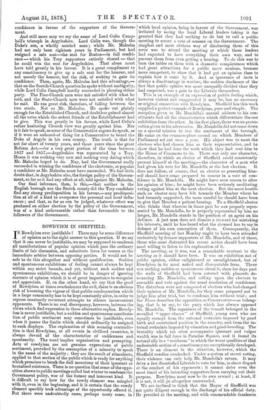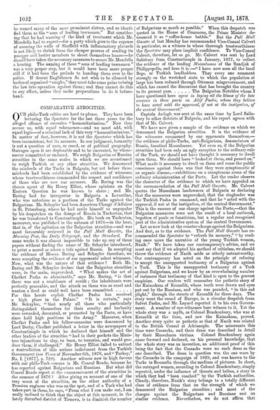ROWDYISM IN SHEFFIELD.
IS Rowdyism ever justifiable ? There may be some difference of opinion as to the right answer to this question. If we say that it can never be justifiable, we may be supposed to condemn all manifestations of popular opinion which pass the ordinary limits of fair discussion, and substitute force for reason as the immediate arbiter between opposing parties. It would not be safe to do this altogether and without qualification. Sudden and spontaneous exhibitions of feeling cannot always be kept within any strict bounds, and yet, without such sudden and spontaneous exhibitions, we should be in danger of ignoring currents of opinion which it is of great importance to recognise and appreciate. If, on the other hand, we say that the good of Rowdyism at times overbalances the evil, there is an obvious risk of lessening the vigour of that public condemnation which in a large community has to be kept constantly alive, in order to repress constantly recurrent attempts to silence inconvenient opponents. There is no real discrepancy, however, between the views which find expression in these alternative replies. Rowdy- ism is never justifiable, but a sudden and spontaneous manifesta- tion of public sentiment may sometimes be justifiable, even when it passes the limits which should ordinarily be assigned to such displays. The explanation of this seeming contradic- tion is that Rowdyism, at all events in civilised countries, is always devoid of the characteristics of suddenness and spontaneity. The word implies organisation and prompting. Acts of rowdyism are not genuine expressions of public sentiment, provoked by the assumption of a minority to speak in the name of the majority ; they are the result of stimulants, applied to that section of the public which is ready for anything which promises to break the dull monotony of their ignorant or brutalised existence. There is no question that some of the oppo- sition shown to public meetings called last winter to condemn the Government policy, was of the former and innocent kind. It is difficult to say how fax the rowdy element was mingled with it, even in the beginning, and it is certain that the rowdy element speedily took advantage of the opportunity offered it. But there were undoubtedly cases, perhaps many cases, in which local opinion, being in favour of the Government, was irritated by seeing the local Liberal leaders taking it for granted that they had nothing to do but to call a public meeting to secure a vote of censure on the Government. The simplest and most obvious way of disabusing them of this error was to attend the meeting at which these leaders had expected to have everything their own way, and to prevent them from even getting a hearing. To do this was to turn the tables on them with a dramatic completeness which had great attractions for a public more anxious, because more competent, to show that it had got an opinion than to explain how it came by it. And as ignorance of facts is always a disadvantage in warfare, the sudden disclosure of the fact that public opinion was more unequally divided than they had suspected, was a gain to the Liberals themselves.
This is an example of an expression of public feeling which, however violent and exaggerated it may be, has no necessary or original connection with Rowdyism. Sheffield has this week supplied a perfect example of Rowdyism, pure and simple. The reception given to Mr. Mundella's annual address to his con- stituents had all the characteristics which differentiate the one exhibition from the other. In the first place, there was no provo- cation given to his adversaries. Mr. Mundella did not come down on a special mission to test the sentiment of the borough. He came on the common-place errand on which Members of Parliament set out once a year. His object was to meet the electors who had chosen him as their representative, and to show that he had done the work which they had sent him to the House of Commons to do. There was only one character, therefore, in which an elector of Sheffield could consistently present himself at the meeting,—the character of a man who had given his vote for Mr. Mundella at the last election. It does not follow, of course, that an elector so presenting him- self should have come prepared to concur in a vote of con- fidence in Mr. Mundella. He might have seen reason to alter his opinion of him ; he might have been seriously meditating voting against him at the next election. But the more hostile such an elector may have felt towards the Member whom he had formerly supported, the more careful he should have been to give that Member a patient hearing. To a Sheffield elector who thinks that whereas in times past he was properly repre- sented by Mr. Mundella, he is properly represented by him no longer, Mr. Mundella stands in the position of an agent on his defence. A just man does not dismiss a steward for mistaking his interests, until he has heard what the steward has to say in defence of his own conception of them. Consequently, the Sheffield meeting of last Monday ought to have been attended exclusively by former supporters of Mr. Mundella, and of these, those who most distrusted his recent action should have been most willing to listen to his explanation of it.
The meeting, as it was, was a remarkable contrast to the meeting as it should have been. It was an exhibition not of public opinion, either enlightened or unenlightened, but of Rowdyism in its most naked and disreputable form. There was nothing sudden or spontaneous about it, since for days past the walls of Sheffield had been covered with placards de-
nouncing Mr. Mundella, and calling upon the electors to assemble and vote against the usual resolution of confidence.
The disturbers were not composed of electors who had changed their opinion of Mr. Mundella, for they came prepared not to judge him after trial, but to condemn him without trial ; and
the Times describes the opposition as Conservative—as belong- ing, that is to say, to the party which has always opposed Mr. Mundella. The organisers of the tumult belonged to the
so-called "upper classes" of Sheffield, young men who are
equally exempt from the external restraints imposed by good birth and ascertained position in the country, and from the in- ternal restraints imposed by education and good-breeding. The brutality which too often accompanies ignorant and vulgar wealth was in full force in Paradise Square, and it found its natural ally in a "residuum" in which the worst qualities of that undesirable section of a constituency are exceptionally developed.
There is an element in the situation, however, which the Sheffield rowdies overlooked. Under a system of secret voting, their violence can only help Mr. Mundella's return. It may drive a few dissatisfied Liberals to vote for him, in sheer disgust at the conduct of his opponents ; it cannot deter even the most timid of his intending supporters from carrying out their purpose. Rowdyism must now be its own reward ; at least, if it is not, it will go altogether unrewarded. We are inclined to think that the Mayor of Sheffield was not quite diligent enough in the discharge of his official duty. He presided at the meeting, and with commendable frankness he named many of the more prominent rioters, and so identi- fied them as the "Sons of leading townsmen." But consider- ing that he had warning of the kind of treatment which Mr. Mundella had to expect—for a party which goes to the expense of covering the walls of Sheffield with inflammatory placards is not likely to shrink from the cheaper process of sending its younger and lustier members to shout themselves hoarse—he should have taken the necessary measures to secure Mr. lldundella a hearing. The naming of these "sons of leading townsmen" was a very proper step, but it would have been more proper still if it had been the prelude to handing them over to the police. If decent Englishmen do not wish to be silenced by bodies of organised "roughs," they must take some pains to bring the law into operation against them; and they cannot do this to any effect, unless they make preparations to do it before- hand.































 Previous page
Previous page